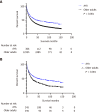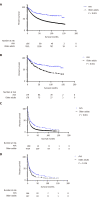Comparison of survival between adolescent and young adult vs older patients with hepatocellular carcinoma
- PMID: 33362910
- PMCID: PMC7739151
- DOI: 10.4251/wjgo.v12.i12.1394
Comparison of survival between adolescent and young adult vs older patients with hepatocellular carcinoma
Abstract
Background: Due to the special clinical features and biologic characteristics of adolescent and young adult (AYA) cancers, AYA cancers are different from cancers in children and elderly individuals. However, there are few reports on AYA hepatocellular carcinoma (HCC).
Aim: To investigate the overall survival (OS) of AYA (15-39 years) and elderly (40-74 years) patients with HCC.
Methods: The data of all the HCC cases were extracted from the Surveillance, Epidemiology, and End Results database from 2004 to 2015 and were then divided into two groups based on age: AYA group (15-39 years) and older group (40-74 years). Kaplan-Meier curves and log-rank tests were used to compare the OS of the two groups. Propensity score matching (PSM) was employed to analyze the OS difference between the two groups. The Cox proportional hazards regression model was used to perform multivariate analysis to explore the risk factors for OS of HCC patients.
Results: Compared to elderly cancer patients, AYA patients with HCC had a worse Surveillance, Epidemiology, and End Results stage, including the distant stage (22.1% vs 15.4%, P < 0.001), and a more advanced American Joint Committee on Cancer (AJCC) stage, including AJCC III and IV (49.2% vs 38.3%, P < 0.001), and were more likely to receive surgery (64.5% vs 47.5%, P < 0.001). Before PSM, the AYA group had a longer survival in months (median: 20.00, interquartile range [IQR]: 5.00-62.50) than the older group (median: 15.00, IQR: 4.00-40.00) (P < 0.001). After PSM, the AYA group still had a longer survival in months (median: 21.00, IQR: 5.00-64.50) than the older group (median: 18.00, IQR: 6.00-53.00) (P < 0.001). The Cox proportional hazards regression model showed that advanced age (hazard ratio [HR] = 1.405, 95%CI: 1.218-1.621, P < 0.001) was a risk factor for OS of HCC patients. In the subgroup analysis, the Cox proportional hazards regression model showed that in AJCC I/II HCC patients, advanced age (HR = 1.749, 95%CI: 1.352-2.263, P < 0.001) was a risk factor for OS, while it was not a risk factor in AJCC III/IV HCC patients (HR = 1.186, 95%CI: 0.997-1.410, P = 0.054) before PSM. After PSM, advanced age (HR = 1.891, 95%CI: 1.356-2.637, P < 0.001) was still a risk factor for OS in AJCC I/II HCC patients, but was not a risk factor for OS in AJCC III/IV HCC patients (HR = 1.192, 95%CI: 0.934-1.521, P = 0.157) after PSM.
Conclusion: AYA patients with HCC have different clinical characteristics from older adults. In different AJCC stages, the two groups of patients have different OS: In AJCC I/II HCC patients, advanced age is a risk factor for OS, but it is not a risk factor for OS in the AJCC III/IV HCC patient group.
Keywords: Adolescent and young adults; Hepatocellular carcinoma; Older adults; Overall survival; Propensity score matching; Risk factor.
©The Author(s) 2020. Published by Baishideng Publishing Group Inc. All rights reserved.
Conflict of interest statement
Conflict-of-interest statement: The authors have no conflict of interest to report.
Figures



References
-
- Coccia PF, Pappo AS, Beaupin L, Borges VF, Borinstein SC, Chugh R, Dinner S, Folbrecht J, Frazier AL, Goldsby R, Gubin A, Hayashi R, Huang MS, Link MP, Livingston JA, Matloub Y, Millard F, Oeffinger KC, Puccetti D, Reed D, Robinson S, Rosenberg AR, Sanft T, Spraker-Perlman HL, von Mehren M, Wechsler DS, Whelan KF, Yeager N, Gurski LA, Shead DA. Adolescent and Young Adult Oncology, Version 2.2018, NCCN Clinical Practice Guidelines in Oncology. J Natl Compr Canc Netw. 2018;16:66–97. - PubMed
-
- Sender L, Zabokrtsky KB. Adolescent and young adult patients with cancer: a milieu of unique features. Nat Rev Clin Oncol. 2015;12:465–480. - PubMed
-
- Overholser L, Kilbourn K, Liu A. Survivorship Issues in Adolescent and Young Adult Oncology. Med Clin North Am. 2017;101:1075–1084. - PubMed
-
- Thomas DM, Albritton KH, Ferrari A. Adolescent and young adult oncology: an emerging field. J Clin Oncol. 2010;28:4781–4782. - PubMed
-
- Tricoli JV, Bleyer A. Adolescent and Young Adult Cancer Biology. Cancer J. 2018;24:267–274. - PubMed
LinkOut - more resources
Full Text Sources
Miscellaneous

